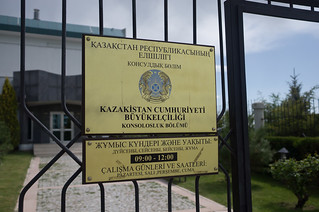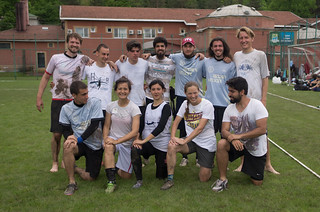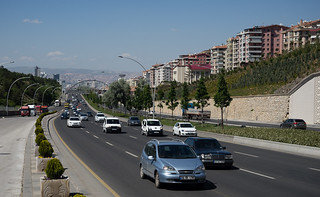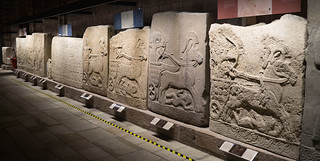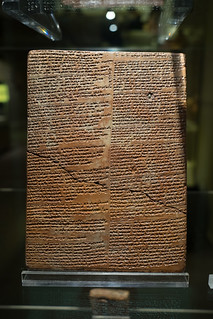We’ve been doubting that we’re prepared for this journey. Our training was particularly lax: I biked less in the month before we left California than during any month in the past two years. The chart below shows the number of miles I biked, by month, in the last year. Note that April has almost zero miles of biking.
We figured we would be able to train on the road. As we learned in the first five days of riding, that can hurt. A lot. Also, in our first few days of riding, we lost a tent pole, our stove stopped functioning, and my seat post tube became damaged (the teeth that keep the seat level have worn out).
We also didn’t prepare much with regards to visas. Unlike in Latin America, where you can just show up at the border of most countries, show an American passport, and enter when you please, many countries in Asia require some type of visa. The Central Asian countries — Uzbekistan, Tajikistan, Turkmenistan, Kazakhstan — all require date specific visas, usually lasting about a month (and it’s nearly impossible to get a regular tourist visa for Turkmenistan without booking a tour, so most bicycle tourists get a transit visa, which allows only five days, set ahead of time). As a result, we had to decide exactly when we will be biking through each country before we applied for our visas.
We spent Thursday, the day after we arrived in Ankara, doing what we probably should have done months ago, but didn’t feel prepared to do without a few days of biking under our belts to gauge our pace — planning out exactly when we will be in each country. We went to the embassies on Friday morning.
One problem: Friday, May 9th, is a holiday in most former Soviet nations. All the embassies were closed. So we would have to wait until Monday, and then wait another four or five days for processing — if everything went according to plan.
Faced with more than a week in Ankara, we left town. Someone we had contacted on couchsurfing invited us to join a frisbee tournament two hours away, and we picked up with a team made up largely of college students from Istanbul. Ultimate is relatively new in Turkey, but the tournament was still good fun (but wet!). I felt good that we could still run around and play with people a decade younger than us, although we were both suffering afterwards and grateful for more time off the bike.
Back in Ankara, we spent the week running errands, visiting embassies, meeting with local climate experts and activists, and making an awesome interactive map of our trip. The next blog entry addresses what we learned from our meetings, and Lindsey plans to write a guide to getting Central Asian visas in Ankara (once we see how the final 2 – Turkmenistan and Azerbaijan – work out through online means). In the meantime, there are several great resources out there already — in particular, we relied on Minwah’s blog, minimeanderings, and carivanistan.com). Note that the rules keep on changing, or are applied inconsistently, so what worked for us may not work for someone else. Still, we found it helpful to have up-to-date information and tips as we planned our attack.
We stayed with Deniz, a host we found through warm showers, and Deniz’s three cats. Deniz runs an adventure group, the Rock Lizards, and was kind to host us, even though he is defending his PhD in just a few weeks and was working until late every night. He has suggested that he might be able to bike with us in Georgia for a little while in a month, and we would be very excited if that works out.
We were also in Ankara during the mining disaster, and I witnessed first hand the protests and tear gas. You can read more about my experience here.
We enjoyed our time in Ankara, but it is perhaps one of the worst cities for biking that I have ever visited. There aren’t many good secondary roads connecting different parts of the city, there’s no bicycle infrastructure, and the drivers are absolutely crazy. Fortunately, the public transit was incredibly efficient, and we used the copious mini buses to get around.
We spent about only half a day being tourists, which we used to visit Ankara’s Museum of Anatolian Civilizations and visit the Citadel. The museum reminded us that we are biking through a region with thousands and thousands of years of history. We are extremely excited to soon bike across the Tigris and Euphrates rivers, the fertile crescent where humanity first built cities.
By Friday, through a combination of persistence and luck, we had visas for Uzbekistan, Tajikistan, and Kazakhstan, and we had applied for visas to Turkmenistan and Azerbaijan. Also, after visiting three bike stores, we found a seat post tube to replace the one on my bike. Our host, Deniz, gave us a tent pole to replace the one that we lost, and Lindsey managed to fix the stove by reading the directions (and cleaning it out).
We might finally be prepared for this trip. Now we’re going back on the road to find out. In many ways, we feel like the trip is now, finally, beginning.








